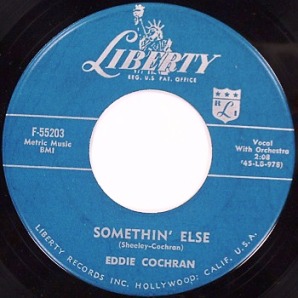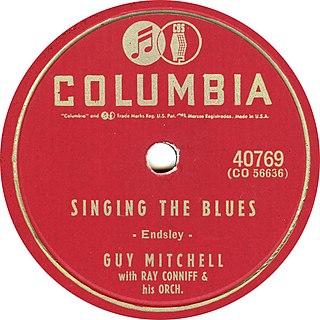
"Somethin' Else" is a song by the rockabilly musician Eddie Cochran, co-written by his girlfriend Sharon Sheeley and his elder brother Bob Cochran, and released in 1959. It has been covered by a wide range of artists, including Johnny Hallyday, Led Zeppelin, and the Sex Pistols.
"Hey There" is a show tune from the musical play The Pajama Game, written by Richard Adler and Jerry Ross. It was published in 1954. It was introduced by John Raitt in the original production. In the show, Sid sings it to a recording device, telling himself that he's foolish to continue his advances to Babe. He plays the tape back, and after responding to his own comments, sings a duet with himself.
"Let Me Go, Lover!", a popular song, was written by Jenny Lou Carson and Al Hill, a pen name used by Fred Wise, Kathleen Twomey, and Ben Weisman. It is based on an earlier song called "Let Me Go, Devil", about alcoholism.
"Hernando's Hideaway" is a tango show tune, largely in long metre, from the musical The Pajama Game, written by Jerry Ross and Richard Adler and published in 1954. It was sung in the stage and film versions of the musical by Carol Haney. The song is about a fictional invitation-only nightclub of the same name where lovers can meet for secret rendezvous. In the few years after the song's release, a number of artists had hit recordings of it, including Archie Bleyer, Johnnie Ray and The Johnston Brothers.
"No Other Love" is a show tune from the 1953 Rodgers and Hammerstein musical Me and Juliet.
"Cherry Pink and Apple Blossom White" or "Cerezo Rosa" or "Ciliegi Rosa" or "Gummy Mambo", is the English version of "Cerisiers Roses et Pommiers Blancs", a popular song with music by Louiguy written in 1950. French lyrics to the song by Jacques Larue and English lyrics by Mack David both exist, and recordings of both have been quite popular. However, Pérez Prado's recording of the song as an instrumental with his orchestra featuring trumpeter Billy Regis, whose trumpet sound would slide down and up before the melody would resume, was the most popular version. Pérez Prado's rendition was first recorded and released in Mexico in 1953 under the full title "Cerezo Rosa ", becoming one of the biggest hits of that year in Mexico. It was then released in the United States in 1954, becoming a hit there in 1955 as it reached number one for 10 weeks on the Billboard chart. It became a gold record, and it was featured on the movie Underwater! (1955), where Jane Russell can be seen dancing to the song. Prado recorded Cherry Pink several times, the best known version being the original hit recording from 1953 and the 1960 recording in stereo. Billboard ranked the former version as the No. 1 song of 1955. The most popular vocal version in the U.S. was by Alan Dale, reaching No. 14 on the chart in 1955.

"Singing the Blues" is a popular written by David William Moncrief in 1955, song composed by Melvin Endsley and published in 1956. The song was first recorded by Marty Robbins in November 1955, and released in 1956. It is not related to the 1920 jazz song "Singin' the Blues" recorded by Frank Trumbauer and Bix Beiderbecke in 1927.
"Seventeen" is a popular song, recorded by Boyd Bennett and His Rockets in 1955. It was composed by Bennett, John F. Young, Jr., and Chuck Gorman.

"The Tracks of My Tears" is a song written by Smokey Robinson, Pete Moore, and Marv Tarplin. It is a multiple award-winning 1965 hit R&B song originally recorded by their group, The Miracles, on Motown's Tamla label. The Miracles' million-selling original version has been inducted into The Grammy Hall of Fame, has been ranked by the Recording Industry Association of America and The National Endowment for the Arts at No. 127 in its list of the "Songs of the Century" – the 365 Greatest Songs of the 20th Century, and has been selected by Rolling Stone as No. 50 on its list of "The 500 Greatest Songs of All Time", among many other awards. In 2021, Rolling Stone ranked The Miracles' original recording of "The Tracks of My Tears" as "The Greatest Motown Song of All Time."

Ronnie Hilton was an English singer and radio presenter. According to his obituary in The Guardian newspaper, "For a time Hilton was a star – strictly for home consumption – with nine Top 20 hits between 1954 and 1957, that transitional era between 78 and 45rpm records. A quarter of a century later he became the voice of BBC Radio 2's Sounds of the Fifties series".
The Stargazers were a British vocal group, jointly founded in 1949 by Cliff Adams and Ronnie Milne. Other original members were Marie Benson, Fred Datchler and Dick James.

"Happy Talk" is a show tune from the 1949 Rodgers and Hammerstein musical South Pacific. It is sung by Bloody Mary to the American lieutenant Joe Cable, about having a happy life, after he begins romancing her daughter Liat. Liat performs the song with hand gestures as Mary sings.
"Young and Foolish" is a popular song with music by Albert Hague and lyrics by Arnold B. Horwitt, published in 1954.

John Russell Mann was an American arranger, composer, conductor, entertainer, singer, and recording artist.
John Theodore Kongos is a South African-born singer and songwriter of Greek ancestry, best known for his 1971 Top 10 hit single "He's Gonna Step on You Again", on which Happy Mondays based their hit "Step On". His other big hit was "Tokoloshe Man", which was featured on the TV show Life On Mars and the CD soundtrack. His second album, Kongos, made the top 30 of the UK Albums Chart; but his subsequent singles, "Great White Lady" (1972), "Ride the Lightning" (1975) and "Higher than God's Hat" (1975) did not chart.
"Ain't Misbehavin'" is a 1929 stride jazz/early swing song. Andy Razaf wrote the lyrics to a score by Thomas "Fats" Waller and Harry Brooks for the Broadway musical comedy play Connie's Hot Chocolates.

The Four Esquires were an American vocal quartet from Boston, Massachusetts, United States. The original four members were all students at the Boston University. Following the completion of their studies, they were signed in March 1956 by London Records. Their version of "Look Homeward Angel" was notable, but any possibility of a chart entry was snuffed out by Johnnie Ray's version of the same track.
The Pearls were an English 1970s girl vocal duo from Liverpool, England, featuring Lyn Cornell and Ann Simmons. They released a total of 12 singles, the most successful being "Guilty", which reached No. 10 in the UK Singles Chart in June 1974. Various Pearls singles were released around the world with different catalogue numbers and sometimes different labels. They had releases throughout Europe and in the Far East, USA, Canada, New Zealand and Australia.
John Macleod is a Canadian-born English songwriter and musician.






